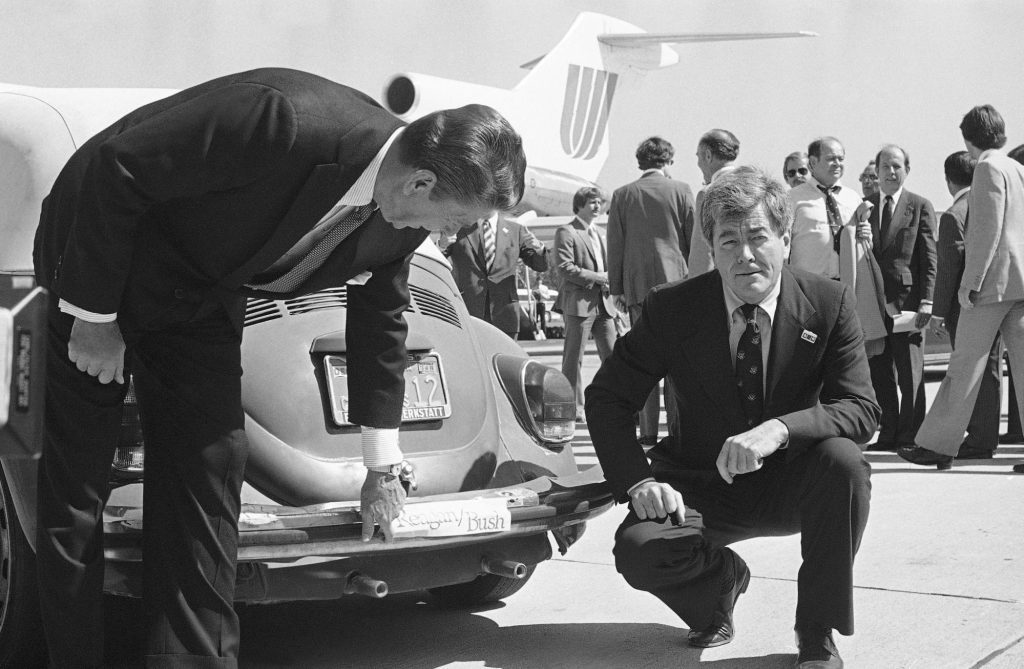FRESNO, Calif. (AP) — Pete McCloskey, a Republican from California who supported the environment, opposed the war, co-wrote the Endangered Species Act, and helped start Earth Day, has passed away at the age of 96.
McCloskey, who often compared himself to Teddy Roosevelt, served as the representative for the 12th Congressional District for 15 years. He ran for president against Richard Nixon in 1972, challenging party leaders during his seven terms in Congress. In later years, he publicly disowned the GOP.
He passed away at his residence on Wednesday, according to a family friend named Lee Houskeeper.
Years after leaving Washington, McCloskey made a final attempt at elective office in 2006 by competing with Richard Pombo in a primary race for Northern California’s 11th District. He described it as “a battle for the soul of the Republican Party.” After losing, he backed Democrat Jerry McNerney, who eventually won.
In a 2008 interview with The Associated Press, the former Marine colonel mentioned that he ran against Pombo because of his dissatisfaction with the modern GOP, stating “I could not stand what a—— they’d become.”
McCloskey explained his party switch in 2007 at the age of 79, citing disillusionment from influence peddling and ethics scandals under the George W. Bush administration. He expressed his frustration with the Republican Party in an open letter to his supporters.
“McCloskey was a rarity in American politics, acting based on a sense of justice rather than political ideology,” said Joe Cotchett, his law partner since 2004. “He abhorred inequity and was unafraid to challenge members of his own political party.”
Born in Loma Linda, California, on September 29, 1927, as Paul Norton McCloskey Jr., he graduated from South Pasadena High School, where he was a second baseman in the school’s baseball hall of fame, despite describing himself as “perhaps the worst player on the baseball team.”
McCloskey served as a Marine Corps officer and led a rifle platoon during intense fighting in the Korean War. He was honored with the Navy Cross, the Silver Star, and two Purple Hearts for his bravery.
After earning his law degree from Stanford University, he founded an environmental law firm in Palo Alto before entering public office. In 1967, he won a special election for the San Mateo County congressional seat, defeating fellow Republican Shirley Temple Black and Democrat Roy Archibald.
During his attempt to unseat President Nixon on an anti-Vietnam War platform, McCloskey tried to enter the 1972 Republican National Convention floor but was prevented by a rule, written by his friend John Ehrlichman, which required a candidate to have at least 25 delegates. McCloskey only had one.
Still, McCloskey enjoyed saying he came in second place.
Later, he visited Ehrlichman in jail, where Nixon's former lawyer served 1.5 years for conspiracy, lying under oath and obstructing justice in the Watergate burglary that caused the president's resignation.
During his time in office, McCloskey also gained attention for becoming friends with Palestinian leader Yasser Arafat and criticizing Israeli influence on American politics. He was the first congressman to call for Nixon's impeachment, and the first to demand a repeal of the Gulf of Tonkin resolution that permitted the Vietnam War.
But what he's remembered for most is the Endangered Species Act, which safeguards species categorized as in danger of extinction or vulnerable and preserves the ecosystems they rely on. McCloskey co-authored the law in 1973, following a campaign by young people empowered by Earth Day events that successfully removed seven of 12 Congress members known as “The Dirty Dozen” for their anti-environment votes.
“On that day, the world changed,” McCloskey recalled in 2008. “Suddenly, everybody was an environmentalist. My Republican colleagues started asking me for copies of old speeches I had given on water and air quality.”
“A strong advocate for endangered species, Pete, paradoxically, became one,” said Denis Hayes, co-organizer of the Earth Day, about the uniqueness of a “green, anti-war Republican.”
After serving 15 years in the House, he lost his campaign for a Senate seat to Republican Pete Wilson, who later became California's governor. He returned to rural Yolo County, enjoying life as a farmer and part-time lawyer.
“You know, if people call you ‘congressman’ all the time, you'll end up thinking you’re smarter than you are,” he said.
McCloskey, however, couldn't stay quiet forever.
In 2006, after his unsuccessful race against Pombo, he helped establish the Revolt of the Elders Coalition, a group of retired Republican congressmen who campaigned for better financial support for soldiers' education, reversing measures that made it harder to investigate ethical violations and protested against those who had received funding from disgraced lobbyist Jack Abramoff, including Pombo.
“If you can do something at age 80 that positively affects our country, you should be proud of it. Otherwise there’s no redeeming value in getting older,” he said.
McCloskey is survived by his wife, Helen — his longtime press secretary whom he married in 1978 — and four children by his first wife: Nancy, Peter, John, and Kathleen.
____
This article contains biographical information compiled by former AP writer Tracie Cone.









